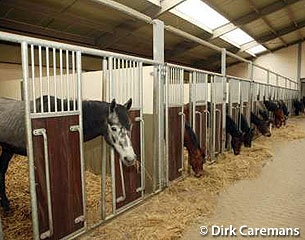
"Horses and abnormal behaviour: a questionnaire answered by trainers, riding schools and horse breeders in three counties in Sweden" is a study conducted by A. Lundberg, M. Andersson, M. Eisersio?, and A. Sandberg for the University of Agricultural Sciences in Skara, Sweden.
Behavioural problems such as crib-biting, weaving and box-walking have been shown to be significantly correlated with our horse management. Behavioural problems can be seen in horses of various breeds, ages and in all equestrian disciplines, however not among feral horses. They are considered to be negative for the horse’s welfare.
Reported frequencies of horses showing abnormal behaviour in different populations are between 1.4- 30.3%. Behavioural problems are often developed at the time of weaning and known preventive factors are social contact with other horses, free movement, a high roughage diet and good weaning practices.
The aim of this study was to investigate how horse breeders, trainers and riding instructors in Sweden experience and think upon behavioural problems in horses. The study was carried out as a questionnaire during 2009 and 2010 and the respondents were contacted by e-mail, mail or phone. The response rate varied between 34% (breeders), 68% (trainers) and 70% (riding schools) and a total number of 10 684 horses was covered.
78% of the breeders had experienced abnormal behaviour among some of their foals. On riding schools 4.6% of the horses performed abnormal behaviour and the correspondent value among trainers was 4.0% of the horses. The most common stereotypi was crib-biting.
The results showed that there exist some misconceptions concerning the inheritance and copying of abnormal behaviours and the knowledge about cause and the preventive factors are deficient. Only 14% of the breeders believed that weaning is a critical period that can cause abnormal behaviour. The advice proposed by trainers and riding schools to treat abnormal behaviour were often very general such as ‘reduce stress’ and 20% of the trainers and 21% of the riding schools did not mention any of the primary needs found in research such as increased social contact, roughage and exercise neither as cause or prevention. Ten percent of the respondents reported incorrect advices. Most believed that behavioural problems are harmful to the horse and will decrease the horse’s value. A majority of the respondents find that the accessible information about behavioural problems is insufficient.
Abnormal behaviour concerns a majority of horse owners but even since a comprising research has been done in this area there is a lack of knowledge on how to prevent and treat behavioural problems with a risk that wrong interventions are taken and a reduced welfare of these horses. There is a need for more education and understanding on how these professional groups best acquire information.
-- 2011 ISES Conference Abstract
Photo © Dirk Caremans
Related Links
The Effect of Tryptophan Products on Stressful Horses
ISES 2011 Bridging the Gap Between Science and Practice